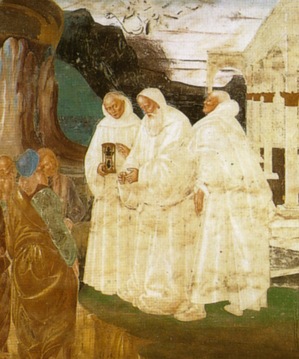All the Hard and Rugged Ways

This is the first part of the conference I gave yesterday, on Sexagesima Sunday, at the clothing of nine Novice Oblates in the Benedictine scapular. The rest of the conference will follow as I find time to sit at my desk and reconstruct it.
A senior shall be assigned to them who is skilled in winning souls, to watch over them with the utmost care. Let him examine whether the novice is truly seeking God, and whether he is zealous for the Work of God, for obedience and for humiliations. Let the novice be told of all the hard and rugged ways by which the journey to God is made. (Rule of Saint Benedict, Chapter 58, On the Manner of Receiving Brethren)
The Journey to God
One becomes a Benedictine Oblate, not because one yearns to escape from the challenging demands of one’s state in life, but because one desires to embrace them, knowing, as Saint Benedict says, that it is by all these “hard and rugged ways” that one makes the journey to God. Is this not the teaching of our Lord Jesus Himself? “And he said to all: If any man will come after me, let him deny himself, and take up his cross daily, and follow me” (Luke 9:23).
A School for the Service of the Lord
Saint Benedict wrote his Rule for Monasteries in order to offer souls the opportunity to enroll for life in a school for the service of the Lord. In the Prologue he explains:
And so we are going to establish a school for the service of the Lord. In founding it we hope to introduce nothing harsh or burdensome. But if a certain strictness results from the dictates of equity for the amendment of vices or the preservation of charity, do not be at once dismayed and fly from the way of salvation, whose entrance cannot be but narrow. For as we advance in conversion and in faith, our hearts expanded and we run the way of God’s commandments with unspeakable sweetness of love.
Thus, never departing from His school, but persevering in the monastery (the Oblateship) according to His teaching until death, we may by patience share in the sufferings of Christ and deserve to have a share also in His kingdom.
Communion
Unlike the monk, who is bound by enclosure in the monastery, and whose life is so arranged that he leaves the enclosure as infrequently as possible, an Oblate, while remaining spiritually anchored to his monastery, lives outside its walls, sometimes at a great distance from the monastery to which he belongs. An Oblate is not dependent upon his monastery in the way a parishioner, for instance, would be upon his parish. Geographical proximity can be a great advantage, but it is not indispensable. There is a communion of mind and heart that, effectively, transcends distances and flourishes more in silence than in frequent verbal or written exchanges.
An Oblate is a true member of the extended monastic family: a family whose members can be scattered over the globe. Wherever an Oblate lives, he finds in the grace of his Oblation a stimulus to persevere in prayer, to learn humility, to love chastity, to obey, to practice works of mercy, and to prefer nothing to the love of Christ.
To Become a Saint
One’s Oblation is a public decision — expressed in the offering of oneself with Christ to the Father, and supported by a particular monastery — to become a saint. There is but one tragedy in a human life, and that is, not to have become a saint. The Oblate subordinates everything else in his life to the pursuit of holiness. This pursuit gives meaning to ordinary daily life, and transforms it.
Husbands and Fathers
The husband and father becomes an Oblate in order to be a better husband and father. He will study the Rule of Saint Benedict with an eye to all that the Holy Patriarch says concerning the abbot of the monastery. The husband and father is the head of his household: the domestic abbot. Nearly everything that Saint Benedict says concerning the abbot can be applied to the father of a family.
Let him study rather to be loved than to be feared. Let him not be excitable and worried, nor exacting and headstrong, nor jealous and over-suspicious; for then he is never at rest. In his commands let him be prudent and considerate; and whether the work which he enjoins concerns God or the world, let him be discrete and moderate bearing in mind the discretion of holy Jacob, who said, “If I cause my flocks to be overdriven, they will all die in one day. Taking this, then, and other examples of discretion, the mother of virtues, let him so temper all things that the strong may have something to strive after, and the weak may not fall back in dismay. (Chapter 64, On Constituting an Abbot)
The father of a family needs to develop and practice the same manly virtues that Saint Benedict recommends to the abbot of the monastery. Chapters 2 and 64 of the Rule, as well as the chapters dealing with the correction of faults (23-30) are particularly suitable for fathers of families.
To be continued.
